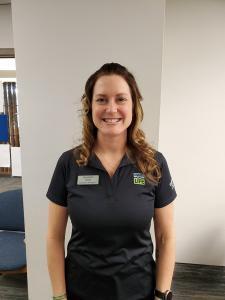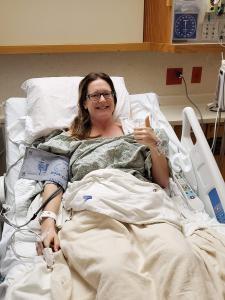Maranda Abitz is starting to feel whole again, even with a piece of her missing.
But while the Marian University assistant registrar, ROTC academic advisor, and Student Veterans Organization advisor continues to recover from a Nov. 21 surgery that saw the removal of her left kidney, it’s a small price to pay when considering the life-changing impact her decision to donate the organ will make.
“Knowing I could possibly help enhance someone’s life, potentially save someone’s life, I just knew I had to do it,” Abitz said. “When you hear about all the good it can do, there really was no other option for me than to help.”
Just Curious
The thought of becoming a living organ donor came to Abitz last year when she initially heard of two fellow Marian University community members having done it in 2018 – Office of Adult and Online Studies Recruiter Tracy Abler in July and former Common Grounds manager Paul Osterholm Sr. in October.
Talking with and hearing their stories got her curious, but attending the panel discussion “Share Your Spare: A Look at Live Organ Donation” got her serious. Featuring eight panelists, including Abler and Osterholm Sr., the stories shared as part of the 2019 Academic Symposium moved Abitz so much that she couldn’t delay any further.
“I just remember sitting there thinking, ‘What a cool thing to do, what a truly amazing way to positively impact, enhance or even save someone’s life,’” Abitz said.
At the suggestion of the panel, Abitz reached out to UW Health in Madison for more information. They directed her to an online form, and upon completion she was assigned a coordinator to ask her additional follow-up questions related to her seriousness and to provide more information related to the process.
Getting Pretty Serious
From there, UW Health set up a full eight-hour day where Abitz was medically tested and evaluated, in addition to meeting with surgeons, nutritionists, nurse practitioners, a social worker and having an electrocardiogram, CT Scan, and x-rays done. At any point a prospective donor could be designated unfit for the procedure, but to Abitz’s relief she never was.
“Being at Step 1 and looking ahead feels daunting, but it’s a major surgery and nothing to take lightly,” Abitz said. “It’s very intensive, very thorough, but they first and foremost want to care for you and ensure you will be able to recover.”
The following week the transplant medical team meets to review candidates. Abitz was listed as having potential, but her high blood pressure at the time raised concerns. Assuring the doctors it was simply nerves, she was sent a blood pressure monitor to wear continuously for 24 hours over a weekend, which ended up not working correctly. The team then encouraged her to, over a three-day period the next weekend, periodically take her blood pressure with an electric blood pressure monitor from Marian’s nursing professional. These results eased the team’s concerns. She also had to get an additional electrocardiogram done locally.
Minutes after receiving her results from the ECG she submitted them to her team at UW Health for evaluation. That’s when she quickly got the email that she was approved to be a donor.
“I was here, I was working, and I just started bawling, I couldn’t contain my excitement after what was a much longer process than I expected it to be,” Abitz said. “I cried at my desk, I screamed. Thankfully everyone around me knew and was immediately supportive and thrilled for me.”
From start to finish the process from making initial contact with UW Health to when Abitz was given her match offer as an altruistic non-direct donor took about four months.
Save the Date
While informing the medical team she would be willing to have the surgery at any time if a match was made, after running a half marathon in October, Abitz also was allowed to designate her preferred date. Working with then-Registrar Tarra Bourgeois, the pair determined Nov. 21 to work best. Within 24 hours Abitz got a call with a match offer, she quickly accepted the match offer, and that surgery date was confirmed.
Arriving at UW Health at 5 a.m., she was greeted by what she described as her own NASCAR pit crew – nurses, anesthesiologists, doctors and surgeons, all performing medical tests and asking countless questions. This was in addition to a four-hour long pre-operation appointment on Halloween to do additional tests and meetings with the medical team.
“It’s a whirlwind of people and things,” Abitz said, especially noting the helpfulness of her surgeon, Joshua D. Mezrich, MD. “How I have any blood left in me I’ll never know, after all of the countless bloodwork labs I had done throughout the different testing and evaluation phases.”
From there she was taken to the operating room, which is where her pre-operation memories end. Putting the anesthesia in, Abitz didn’t have enough time to even count to two before she was out. The surgery to remove her left kidney lasted four hours, and upon completion she was wheeled into a recovery area occupied only by the medical team. She was then moved to the transplant recovery floor, where her post-surgery memories begin.
“I saw my husband and my mom and I just started crying,” Abitz said. “There was some pain, but not a lot, it was just a lot of IVs in my arms, taking in oxygen, and basically getting poked everywhere to check my vitals and monitor more labs.”
Abitz’s kidney, Betty the Bean, was flown commercially to Massachusetts and at 8 p.m. was successfully placed in the recipient aged 40-50. Not knowing the person’s identity, she was allowed to write them a letter before her surgery, with it being delivered along with the kidney. The person knows the kidney is from a Wisconsin living donor aged 30-40, and they are allowed to write back should they choose.
“I know that they were a hard recipient to match with and were very, very happy when I said ‘yes,’” said Abitz, noting that it closed the loop on a six-person chain. “I have A-Positive blood and only one percent of people in the world have the type of specific blood breakdown that I had.”
The Road to Recovery
Abitz was hospitalized for three days – the surgery on Thursday, a recovery day on Friday and then went home Saturday afternoon. Her first week home presented some challenges, but nothing unmanageable – she had the help of her family, and she had done enough research through kidney donor support groups on Facebook that she felt prepared. There were moments of soreness and fatigue and “post-surgery brain,” but nothing unmanageable.
“Seeing everyone’s story was not only inspiring, but insightful – it showed that people can come back from this and be exactly like they’ve always been,” Abitz said. “It’s really amazing to see real life examples of people doing well after the surgery.”
In fact, her recovery is going better than expected. While her original post-surgery appointment was Dec. 19 she managed to have it moved up to Dec. 9. She has gone from walking slowly to walking around campus and at home, returning to work early when the initial thought was Jan. 2.
“Everyone on campus has been supportive, encouraging and I am being shown a lot of love,” Abitz said. “The students throughout all of this have been so amazing and supportive and have really helped in my recovery. Each day has been better, each week has been better.”
How You Can Help
According to OrganDonor.gov, nearly 6,000 living donations take place each year – about 4 out of every 10 donations.
Donate Life America, meanwhile, estimates 113,000 people are waiting for a lifesaving transplant – another person is added to the waiting list every 10 minutes, and 22 people die each day because the organ they need is not donated in time.
Those interested in becoming a living organ donor can visit the UW Health resource site, or utilize Donate Life America’s resource page to find out more information. UW Hospital in Madison saw a large increase in 2019 of kidney donations with 28 total – its first non-directed donor in 2003 and from then until 2017 there were an average of four such donors every year, and 2018 saw 12 donations. The National Kidney Registry reported nearly 300 such donations occurred nationwide in 2019.
“Talk to a living donor, or even a recipient, and see how it affected their life, ask us what our experience was like,” Abitz said. “Reach out, everyone is more than happy to answer your questions and tell you about the tremendous impact it has on donors, recipients, and their family and loved ones.”



